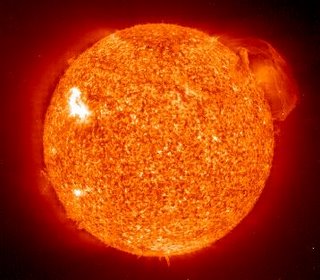 De gangbare theorie is dat we te veel CO2 en andere 'broeikasgassen' produceren die in de atmosfeer het zichtbare licht wel doorlaten maar de warmtestraling niet waardoor de gemiddelde temperatuur op aarde hoger wordt, met alle gevolgen van dien (Al Gore: An Inconvenient Truth - Wikipedia)
De gangbare theorie is dat we te veel CO2 en andere 'broeikasgassen' produceren die in de atmosfeer het zichtbare licht wel doorlaten maar de warmtestraling niet waardoor de gemiddelde temperatuur op aarde hoger wordt, met alle gevolgen van dien (Al Gore: An Inconvenient Truth - Wikipedia)Er zijn echter geleerden die daar totaal anders over denken. Bijvoorbeeld Habibullo Abdusamatov, hoofd van het Space Research Laboratory van het Pulkovo Observatory in St Petersburg. Volgens hem bevinden we ons in een tijdperk met een relatief hoge sterkte van de straling van de zon. Daardoor wordt het op aarde warmer en gaan de oceanen meer CO2 afgeven. Oorzaak en gevolg zijn hier dus precies tegengesteld aan het gangare verhaal.
Enkele citaten:
In plaats van ons te bekommeren over een paar graden opwarming in de komende jaren zouden we ons volgens hem meer zogen moeten maken over een komende ijstijd als de stralingsintensiteit van de zon weer gaat afnemen:"Global warming results not from the emission of greenhouse gases into the atmosphere, but from an unusually high level of solar radiation and a lengthy - almost throughout the last century - growth in its intensity,"
"It is no secret that when they go up, temperatures in the world's oceans trigger the emission of large amounts of carbon dioxide into the atmosphere. So the common view that man's industrial activity is a deciding factor in global warming has emerged from a misinterpretation of cause and effect relations."
"Instead of professed global warming, the Earth will be facing a slow decrease in temperatures in 2012-2015. The gradually falling amounts of solar energy, expected to reach their bottom level by 2040, will inevitably lead to a deep freeze around 2055-2060,"Lees verder: RIA Novosti - Russia - Russian academic says CO2 not to blame for global warming
Nigel Weiss, Professor Emeritus aan het Department of Applied Mathematics and Theoretical Physics aan de Universiteit van Cambridge, voormalig President van de Royal Astronomical Society heeft dezelfde opvattingen: Over het verloop van de zonneactiviteit zegt hij:
Typically, sunspots flare up and settle down in cycles of about 11 years. In the last 50 years, we haven't been living in typical times: "If you look back into the sun's past, you find that we live in a period of abnormally high solar activity,"
"These hyperactive periods do not last long, perhaps 50 to 100 years, then you get a crash, 'It's a boom-bust system, and I would expect a crash soon."
In addition to the 11-year cycle, sunspots almost entirely "crash," or die out, every 200 years or so as solar activity diminishes. When the crash occurs, the Earth can cool dramatically. Dr. Weiss knows because these phenomenon, known as "Grand minima," have recurred over the past 10,000 years, if not longer.
Lees verder: Will the sun cool us?
Update 2007-04-15 See also: LinkNotes: Klimaatverandering
Bron: Al Fin: Solar Power: Driving the Climate